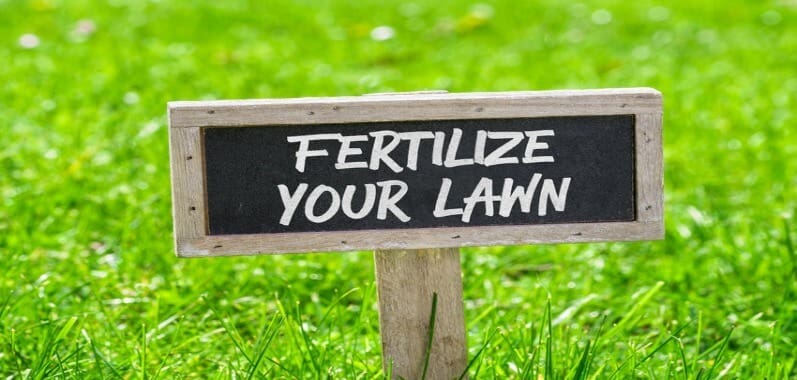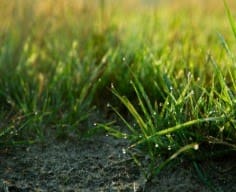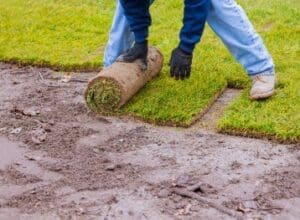
Are you looking to add fertilization to your lawn care routine? There are so many different kinds it can be hard to tell which one will fit your lawn needs. If you’ve wandered through the gardening section, you’ve come across the stacks of different fertilizers. You may have wondered what’s the difference between lawn starter fertilizer vs regular fertilizer? Keep reading to learn which one is right for your lawn!
Why is fertilizer important for your lawn?
 Nutrients, such as nitrogen (N), potassium (K), and phosphorous (P), also known as the NPK, are needed for a healthy lawn to flourish. You can create high-quality soil for your lawn by applying fertilizer one to three times a year.
Nutrients, such as nitrogen (N), potassium (K), and phosphorous (P), also known as the NPK, are needed for a healthy lawn to flourish. You can create high-quality soil for your lawn by applying fertilizer one to three times a year.
Over time, soil naturally loses nutrients that are essential for growth. Fertilizer replenishes these nutrients to help your lawn become thicker, lusher, and greener. It can help your lawn level up by giving it the nutrients to be more durable and give it that beautiful, deep green color.
It is important to note that not all fertilizers are equal. When choosing between starter fertilizer vs regular fertilizer you should consider the state of your plant’s life. Both are needed during a plant’s life cycle but at different stages. Emerging seedlings have different nutrient needs than mature plants.
What is Starter Fertilizer?
Starter fertilizer helps grass seedlings and sod roots establish quickly in the soil. Assisting in the growth of a thick new lawn in a short amount of time. Depending on the brand, starter fertilizer usually contains 20% or more potassium than regular fertilizers.The extra potassium helps create a rich soil environment that will sustain the seedlings for about a month. Most starter fertilizers will contain quick-release nitrogen as well. Nitrogen gives the seeds a nutritional boost to promote healthy germination.
When should I Use Starter Fertilizer on my lawn
You have a few options when choosing the best time to fertilize. You can apply before seeding or laying sod, or after you plant the new grass seedlings. After planting you should wait six to eight weeks before reapplying the starter fertilizer. If you fertilize too early, it could result in the roots of the seedlings not being able to absorb the nutrients.
Can I use Starter Fertilizer on Mature Grass?
 You can, but don’t. It won’t hurt your grass to use starter fertilizer, but it will lack needed nutrients. Resulting in an unhealthy lawn in the long run. It is better to use a fertilizer specifically for mature lawns. Regular fertilizers contain slow-release nutrients that aid continuous growth and health maintenance.
You can, but don’t. It won’t hurt your grass to use starter fertilizer, but it will lack needed nutrients. Resulting in an unhealthy lawn in the long run. It is better to use a fertilizer specifically for mature lawns. Regular fertilizers contain slow-release nutrients that aid continuous growth and health maintenance.
You can, but don’t. It won’t hurt your grass to use starter fertilizer, but it will lack needed nutrients. Resulting in an unhealthy lawn in the long run. It is better to use a fertilizer specifically for mature lawns. Regular fertilizers contain slow-release nutrients that aid continuous growth and health maintenance.
What is regular fertilizer?
There are fertilizers for all kinds of crops and plants. Make sure to use fertilizer specially designed for grass. Regular fertilizers have a NPK ratio of 1-2-1.The numbers refer to the percentage of each substance that the fertilizer contains. Regular fertilizers usually have slow-release varieties that benefit mature plants.
When Should I Apply Regular Fertilizer on My Lawn?
The best time to fertilize your lawn if you fertilize once a year is in the fall. When it’s in the prime growing season and storing nutrients. Regular fertilizer should be used at least four weeks or a max of eight weeks after your grass has been seeded. For the best results, fertilize your lawn three to four times a year, in the summer, spring, and fall. The nutrients in the slow-release fertilizer will insure strong, healthy grass throughout the season.
Professionally Applied Lawn Starter Fertilizer in Parkville MO
 Can I Use Regular Fertilizer on my New Lawn?
Can I Use Regular Fertilizer on my New Lawn?
It is strongly not recommended. Regular fertilizers are full strength compared to dilated starter fertilizers. Regular fertilizers can burn the roots, stems and leaves of tender seedlings.
Which One Should I Choose?
That depends, If your lawn is mature and established it is best to go with a regular fertilizer that will meet the needs of your soil. To learn your soil’s specific needs, we suggest taking a soil test. If you are planting new grass with sod or seeds it’s best to use starter fertilizer. If you are overseeding your lawn, you can apply a starter fertilizer before or directly after seeding. Starter fertilizers are especially useful if your soil Phosphorus (P) is low, which can be determined by a soil test.
If you would like a professional fertilization consolation from the Kansas city professionals. Contact Green Seasons Lawn & Tree Service for full lawn and tree care programs.
